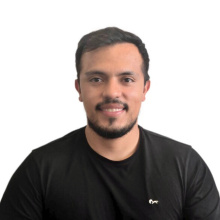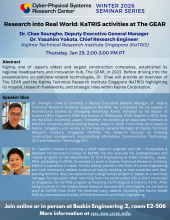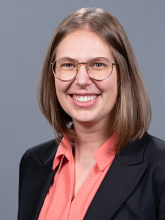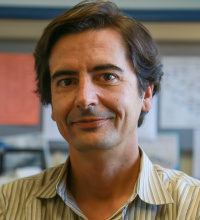CPS Events
Neural Hybrid Equations: Structure-Preserving Models for Hybrid Systems
Abstract
Many engineered systems combine continuous-time evolution (flows) and discrete-time evolution (jumps). Examples include robotic systems with contact dynamics, power networks with switching logic, and biological systems with threshold-crossing events. Learning neural 'world models' for such systems often involves sampling time-series data densely and training a single neural network. When the hybrid structure goes unrecognized, data viewed along a single time axis appears discontinuous. Standard universal approximation theorems, however, apply to continuous functions, creating a mismatch between the observed data and the theoretical guarantees underpinning the learning approach.
In this talk, we introduce neural hybrid equations, which use separate neural networks for continuous and discrete dynamics while preserving the logic of when flows and jumps occur. The central question concerns how approximation errors in these maps propagate through trajectories of the system. We establish that solutions to neural hybrid equations approximate nominal hybrid system solutions arbitrarily well over compact time domains, with O(1/N) convergence rates for ReLU networks with N neurons.
We conclude by discussing future directions, including extending guarantees to infinite horizons for contractive or stable systems and leveraging connections between spiking neural networks and ReLU architectures to enable neuromorphic implementations.
Speaker Bio
Daniel E. Ochoa is a Postdoctoral Scholar in the Department of Electrical and Computer Engineering at the University of California, Santa Cruz. He received his Ph.D. in Electrical and Computer Engineering from UC San Diego in 2024, M.Sc. degrees in Electrical Engineering from the University of Colorado, Boulder, in 2022, and in Electronics Engineering from the University of Los Andes, Colombia, in 2019, and dual B.Sc. degrees in Electronics Engineering (cum laude) and Physics from the University of Los Andes. His work has been recognized with the Robert Skelton Systems and Control Best Ph.D. Dissertation Award from the Center for Control Systems and Dynamics at UC San Diego in 2025, an IFAC Young Author Award in 2024, and designation as a Rising Star in Cyber-Physical Systems by the University of Virginia and the National Science Foundation in 2022. His research develops mathematical foundations for control and analysis of hybrid dynamical systems, geometric control theory, contraction analysis, and learning-based methods to establish formal guarantees for autonomous cyber-physical systems.
Research into Real World: KaTRIS activities at The GEAR
Abstract
Kajima, one of Japan’s oldest and largest construction companies, established its regional headquarters and innovation hub, The GEAR, in 2023. Before driving into the presentations on concrete-related technologies, Dr. Chae will provide an overview of The GEAR and the Kajima Technical Research Institute Singapore (KaTRIS) highlighting its mission, research frameworks, and strategic roles within Kajima Corporation.
Speaker Bios
Dr. Soungho Chae is currently a Deputy Executive General Manager of Kajima Technical Research Institute Singapore (KaTRIS). He completed his 1st Degree in Architectural Studies at Chungang University, Korea, followed by his Master of Science (MSc) Degree in 1992 and Doctor of Philosophy (PhD) Degree in 2003 from the WASEDA University, Japan. Thereafter, he worked as an Associate Professor at WASEDA University before joining Kajima, Japan in 2006. From 2018, he is based in Kajima, Singapore and serves as the Deputy General Manager at Kajima Technical Research Institute, Singapore (KaTRIS). His research focuses on building construction management, incorporating Information Communication Technology (ICT) and Robotics Technology (RT).
Dr. Yasuhiro Yokota is currently a chief research engineer and GM – Sustainable & Resilient Infrastructure Group in KaTRIS. He has pursued his undergraduate and master program in the Department of Civil Engineering at Kobe University, Japan. After graduating in 2006, he started to work at Kajima Technical Research Institute, Kajima Corporation in Japan. He has mainly worked in the field of tunnel engineering and rock mechanics related projects primarily working on new materials and Geo-sensing technics. Also, he experienced a large tunnel project in Japan as a technical manager for two years. After returning from the construction site in 2015, he moved to Singapore, for his PhD program at Nanyang Technological University (NTU). After being involved in the collaborative research between NTU and Kajima, he started to work at KaTRIS from 2019. He received many awards including the Rocha Medal 2021 by International Society of Rock Mechanics and Rock Engineering.
Tactile Sensing: At the Boundary Between Mechanical and Computational Intelligence in Robotic Grippers
Abstract
Robot grippers typically include mechanical intelligence (e.g., underactuation, compliance) or computational intelligence (e.g., fully actuated with a wide array of sensors). Next generation grippers and hands will require both intelligences to work in concert across applications with resilience and dexterity. This talk will introduce the concept of mechanical and computational intelligence co-design through example case studies that focus on the particular importance of embodied sensitivity as a feature of the co-design process. For example, the most recent work on the Smart Suction Cup, conducted largely by Dr. Jungpyo Lee, demonstrates how design decisions like the number of sensitive chambers influences the resultant robot arm controller as well as physical compliance and manufacturing feasibility and cost.
Speaker Bio
Dr. Hannah Stuart is an Associate Professor in the Department of Mechanical Engineering at the University of California at Berkeley. She received her BS in Mechanical Engineering at the George Washington University in 2011, and her MS and PhD in Mechanical Engineering at Stanford University in 2013 and 2018, respectively. Her research focuses on understanding the mechanics of physical interaction in order to better design systems for dexterous manipulation. Applications range from remote robotics to assistive orthotics. Recent awards include the NSF CAREER grant, NASA Early Career Faculty grant, Hellman Fellows Fund grant, and Johnson & Johnson Women in STEM2D grant. She is a Senior Member of IEEE.
Emergent Behavior, Robustness, and Adaptation in Heterogeneous Multi-Agent Systems
Abstract
Throughout the talk, we aim to convince you that enforcing consensus within a multi-agent system, despite agent heterogeneity, gives rise to new behaviors described by so-called blended dynamics. This phenomenon turns out to be useful in designing distributed algorithms. Understanding this process also provides insights into how robustness emerges within synchronized groups of agents. Finally, we will argue that enforced synchronization can also lead to the consensus of vector fields through parameter adaptation across the agents.
Speaker Bio
Hyungbo Shim received his B.S., M.S., and Ph.D. degrees from Seoul National University. He was a postdoctoral researcher at the University of California, Santa Barbara, and is currently a professor at Seoul National University. He has served as an associate editor for Automatica, IEEE Transactions on Automatic Control, and the International Journal of Robust and Nonlinear Control. He is a senior member of IEEE, an IFAC Distinguished Lecturer, and a member of the Korean Academy of Science and Technology. His research interests include stability analysis of nonlinear systems, observer design, disturbance observers, secure control systems, and synchronization in multi-agent systems.
Reinforcement Learning for Large-Scale Games
Abstract
This talk addresses the use of reinforcement learning in two-player zero-sum Markov games with finite but large state spaces, for which the goal is to find minimax policies with “modest”' computation. We use the qualifier “modest” to mean that we seek to certify policies as optimal without exploring the full state-space of the game.
The approach followed is strongly motivated by Q-learning, which was proposed in the late 1980s to extend the single-player dynamic programming principle to model-free reinforcement learning by eliminating the need for a known transition model. Extensions of Q-learning to two-player zero-sum games appeared shortly after. Since then, most of the work devoted to proving correctness of Q-learning relies on establishing that its iteration converges to a unique fixed-point of a Bellman-like equation, which generally requires exploring the full state-space.
We will see that, for zero-sum games, it is possible to construct provably correct optimal policies using algorithms inspired by Q-learning, without requiring convergence of the Q function over the whole state-space. In fact, the samples used to update the Q-function may not even explore the whole set of reachable states and, for certain classes of games, the fraction of explored states gets smaller and smaller as the size of the state-space increases.
Speaker Bio
João Pedro Hespanha received his Ph.D. degree in electrical engineering and applied science from Yale University, New Haven, Connecticut in 1998. From 1999 to 2001, he was Assistant Professor at the University of Southern California, Los Angeles. He moved to the University of California, Santa Barbara in 2002, where he currently holds a Distinguished Professor position with the Department of Electrical and Computer Engineering.
Dr. Hespanha is a Fellow of the International Federation of Automatic Control (IFAC) and of the IEEE. He was an IEEE distinguished lecturer from 2007 to 2013. His current research interests include multi-agent control systems; game theory; optimization; distributed control over communication networks (also known as networked control systems); stochastic modeling in biology; and network security. Additional information about his research and publications available at https://web.ece.ucsb.edu/~hespanha/.






